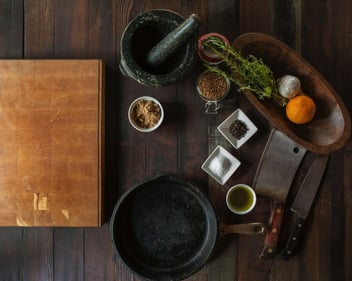Food writing is much more than a description of a scrumptious snack. At it’s best, it’s a gateway to culture and history, a family ritual, or a deeper environmental understanding. In preparation for our upcoming Food Writing Competition, we’re taking a look at what our experts say are the essential tips (ingredients) for great food writing.
Ingredient 1: Make Friends with Your Food
Food blogger and former Food Writing Competition guest judge Jerrelle Guy says that before writing about your food, you must first get to know it: “You should be eating a lot and cooking a lot … Allow yourself to get lost in the sensory experience and take notes so when you go back to your desk to put pen to paper, you’re able to recall all that you tasted, saw, smelled, felt, and heard. Then, describing the food will be easy and your readers will be brought right there to the table with you.”
Ingredient 2: Read Up
Food writing might not be a genre you’re very familiar with, so the best way to understand what you’re aiming for is to immerse yourself in it. Professional food writer and former Food Writing Competition guest judge David Prior recommends reading the following:
- The food section of the New York Times
- T: The New York Times Style Magazine
- Observer Food Monthly
- Australian Gourmet Traveller
- Condé Nast Traveler
Ingredient 3: Put Your Food in Context
The key to food writing is using your chosen dish to illuminate some aspect of the world around it, such as history, geography, culture, or commerce. Once you’ve figured out what your particular food can reveal about how we live, it’s time to hit the books.
Last year’s Food Writing Competition winner Gabriel Yap notes, “The subject matter I chose, Peranakan cuisine, was very niche and may not have been familiar to readers outside of the Southeast Asia region. I decided to not only include narrative elements in my piece, but to include additional information about background and cultural context, which I did further research on.”
So, according to our experts, the key to great food writing is to eat, read, and write.
Come to think of it, these tips don’t just make for great food writing—they make for a great life! As noted food writer, cook, and our current Food Writing competition guest judge Stephanie Alexander says, “In the end, I still believe there is no greater joy than sharing food, conversation and laughter around a table.”





